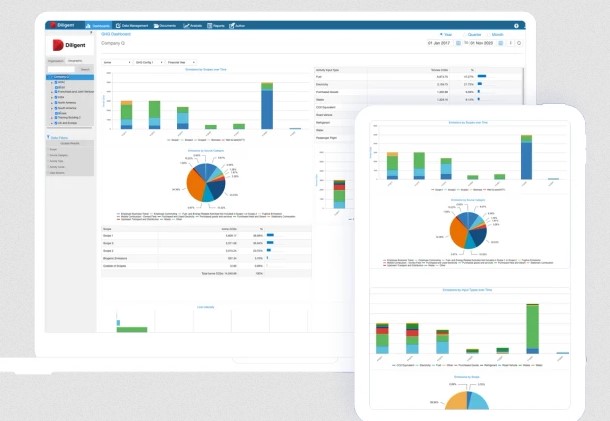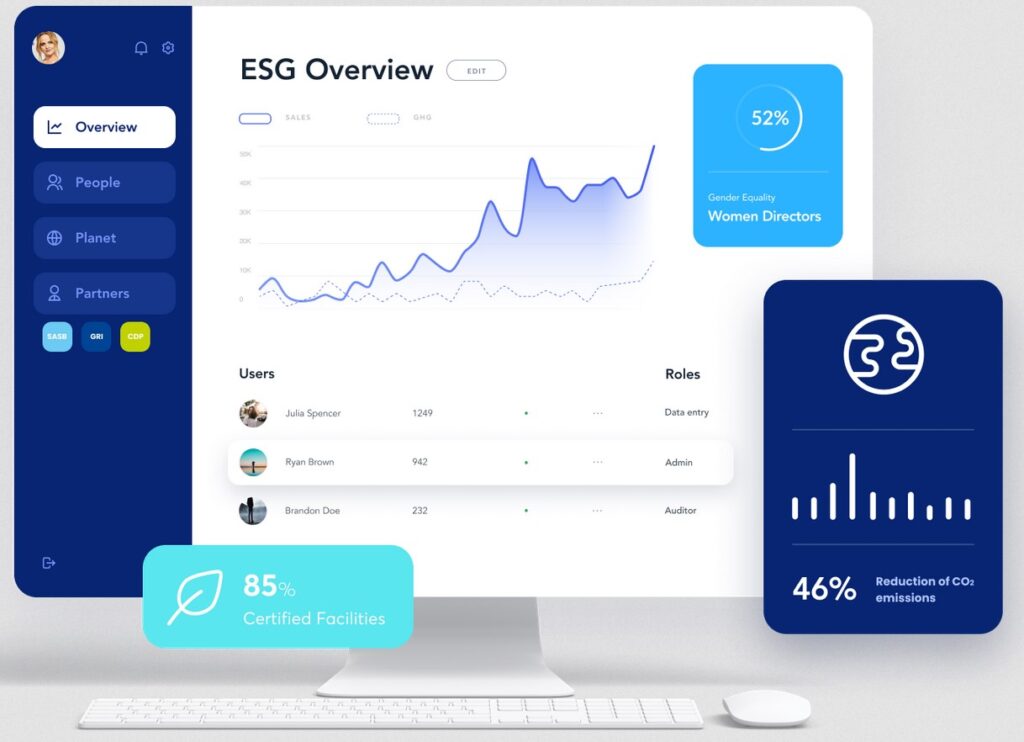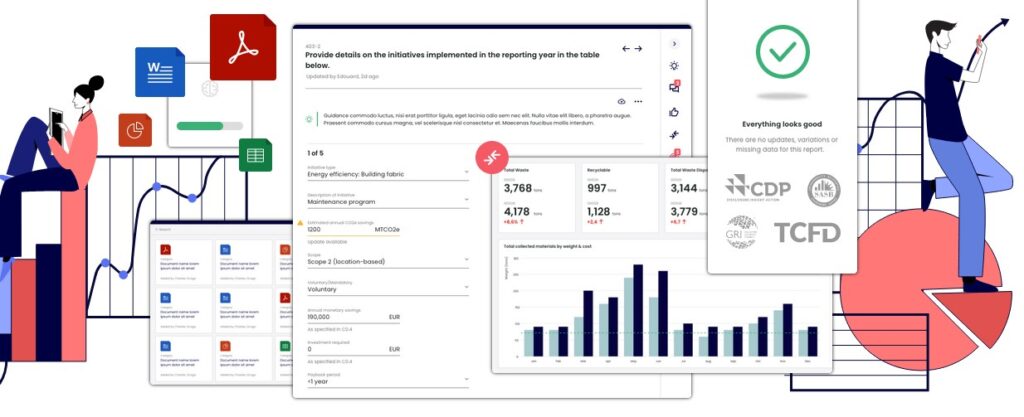In today’s interconnected world, corporate growth and profitability are difficult without investments in environmental and social aspects. Governments worldwide also mandate companies to invest in the environment and social causes, as a part of corporate responsibility.
We evaluated hundreds of ESG reporting software and came up with the below list:
- IBM Envizi An advanced tool to streamline ESG reporting and compliance with frameworks like GRI, UD SDGs, SASB, ESRS, and more.
- Diligent ESG & Diversity A GRC SaaS company that combines GRC, ESG, and audits for comprehensive compliance.
- Nasdaq Metrio An end-to-end sustainability reporting solution to help enterprises meet their unique ESG goals.
- Novisto ESG A sustainability management software that helps companies gain value from their ESG initiatives.
- SustainIQ An all-in-one ESG reporting tool for measuring and reporting environmental and social data.
As a result, Environmental, Social, and Governance (ESG) compliance has become an important part of an organization’s operations. Read on to learn all about ESG compliance and how to select the best tool, followed by a detailed review of the top ESG reporting software.
What is ESG Compliance?
ESG compliance refers to a set of standards and guidelines a company implements in its internal policies to positively impact the physical environment and society at large. These standards consist of the three aspects described below.
Environmental
This component encompasses the impact of an organization on the surrounding environment. Specifically, it includes the company’s carbon footprint, the use of toxic products in its operations, sustainability efforts, and the steps it has taken to mitigate climate change. Some reporting requirements also require the impact of waste disposal.
Social
The social component includes the company’s relationship with its employees, customers, investors, vendors, and other stakeholders. More importantly, it looks into how organizations handle issues like racial diversity, work ethics, gender equality, and more. This component also considers the relationship with the immediate community and the measures taken to address social causes.
Governance
Governance includes the internal goals, policies, and processes that the organization takes to drive sustainable growth and profitability. It also covers the rights and responsibilities of stakeholders and the measures taken to promote transparency and communication.
Overall, ESG compliance ensures that environmental and social responsibilities are integrated into the corporate strategy to provide well-rounded growth that benefits all stakeholders, including the community and the physical environment in which the company operates.
Additionally, ESG compliance creates a sense of trust in the company’s ethics and practices and can bring in more investors, customers, and employees.
Next, let’s talk about the different ESG compliance frameworks and standards an organization can comply with.
ESG Frameworks and Standards
Frameworks are a broad set of guidelines that provide direction for organizations without providing a concrete set of steps or methodology. ESG standards, on the other hand, are more specific and strict criteria that organizations must follow, and could also include submitting timely reports. Sometimes, failure to comply with standards can lead to fines and penalties.
Now that you know the difference between frameworks and standards, let’s explore the available options.
ESG Frameworks
Below are the prominent ESG frameworks.
- Climate Disclosure Standards Board – Requires a voluntary disclosure of data regarding environmental impact, climate-related risks, water security, and carbon footprint.
- Global Reporting Initiative – Organizations must provide information like inclusiveness, diversity of stakeholders, gender equality, and more.
- Carbon Disclosure Project – Organizations operating in oil, coal, and chemical production must disclose their carbon footprint and the steps they are taking to mitigate their environmental impact.
- Sustainability Accounting Standards – Covers five critical sustainability areas – human capital, social capital, environment, business model, and innovation.
- Dow Jones Sustainability Indices – This framework has worldwide credibility and assesses organizations on long-term economic, social, and environmental impact.
- United Nations Sustainable Development Goals – Lists 17 goals that help create a sustainable and equitable future for everyone. It is highly inclusive and covers many environmental, social, and sustainability problems.
ESG Standards
The ESG standards are:
- Global ESG Disclosure Standards – Ethical standards that require organizations to disclose the ESG impact of a product.
- Sustainable Finance Disclosure Regulation – Enacted by the European Parliament, this standard mandates fund managers to help customers understand the sustainability profile of funds and encourages the flow of funds into sustainability-focused firms.
- EU Taxonomy – Lays down what economic activities are sustainable to help investors make informed investing decisions.
- Corporate Sustainability Reporting Directive (CSRD) – Helps stakeholders assess the non-financial performance of organizations.
- Corporate Sustainability Due Diligence Directive (CSDDD) – Mandates businesses to address the adverse impact of their actions, within and outside their value chains, regardless of the location.
- Streamlined Energy and Carbon Reporting (SECR) – A UK regulation that requires companies to implement energy efficiency measures.
These frameworks and standards are not an exhaustive list, but they show the many choices available. However, it’s difficult to comply with all of them, and for all practical purposes, not required because each compliance consumes considerable time and resources. Decide which ones you want to comply with based on aspects like the reason for your compliance, which ones are accepted by your stakeholders, the suitable options for your industry and organization, and the scope of coverage. With good planning and strategy, you can comply with multiple frameworks with the same effort.
Regardless of which compliance framework or standard you choose, you need the right software platforms for their efficient and streamlined compliance. Moreover, these platforms support multiple compliance options, saving time and effort for your team. But the key is to select the best fit based on your organization’s goals, choice of ESG frameworks and standards, and compliance reasons.
Next, let’s look at some of the best available choices.
Our Methodology
The criteria we used for evaluation are:
- A user-friendly interface.
- Extensive customization options to meet different industries and ESG frameworks.
- Data integration with multiple sources and in varying formats.
- Actionable and in-depth insights.
- Good technical support.
Best ESG Reporting Software
Let’s now do an in-depth review of each tool.
1. IBM Envizi
Envizi is a suite of tools that helps with ESG reporting and compliance. This modular solution can be customized to meet your specific compliance needs. I noted that Envizi ensures compliance with frameworks like GRI, UN SDGs, and more, as it consolidates all the requirements into a single platform.
Source: IBM
Let’s see how Envizi can help with ESG reporting.
Extensive Data Capture
With Envizi, you can easily capture data from third parties to assess their impact on your ESG goals. Moreover, it can automatically capture data across your internal systems like ERP, finance, property management databases, supplier data files, and other business platforms. All this data is consolidated and analyzed for deep insights.
Data Normalization and Structuring
The data collected can be in different formats, but they are all converted into comparable units and periods for easy comparison. This way, you can discover trends and patterns over time for informed decision-making. It also supports advanced features like data tagging for retrieval, extraction, and analysis.
Direct Reporting
Envizi has dedicated API connectors and algorithms to help you report directly to certain frameworks. The advantage is that you can use the same dataset to comply with multiple frameworks. You can even customize these reports based on specific tags. Its algorithms will also handle the required calculations like your carbon footprint, water and energy usage, and more.
With such features, Envizi can greatly reduce your time while ensuring simultaneous compliance with multiple ESG frameworks.
Pros:
- Extensive reporting and analytics.
- Monitors emissions.
- Supports environmental compliance.
- Well-developed APIs for data collection.
Cons:
- Expensive
- No mobile app.
2. Diligent ESG & Diversity
The Diligent platform combines ESG with goal setting, risk management, and stakeholder reporting for comprehensive insights and actionable intelligence. Diligent ESG acts as a unified platform to comply with the requirements of different frameworks. It benchmarks against evolving provisions and generates reports on the compliance status of each.
Source: Diligent
Below are Diligent ESG’s important features.
Carbon Accounting
Diligent automatically gathers data from different sources to calculate your greenhouse emissions. It also offers 80+ pre-built reports populated with your real-time data and calculations for audit submissions. As a result, Diligent becomes the single source of truth for all your ESG reporting and compliance needs.
Board Diversity
A pressing issue faced by many organizations is the lack of diversity in boardrooms. I found that you can avoid this problem with Diligent, as it continuously compares your diversity policy and tracks the progress against it. Moreover, it keeps a pulse on stakeholders’ and shareholders’ opinions about your board composition and informs you of the trends.
Centralized and Scalable
Another advantage of Diligent is that it gathers data from different sources and centralizes the analysis to provide a single source of truth for your reporting needs. You can also use this data to prove the efficiency and success of your ESG initiatives.
Overall, Diligent simplifies ESG monitoring and reporting and meets multiple regulations and frameworks. Also, it showcases how your ESG initiatives support business outcomes.
Pros:
- Extensive metrics.
- Highly effective in comparing results with policies.
- Collects data from multiple sources.
- Standardized reports.
Cons:
- Steep learning curve.
- The user interface is technical.
3. Nasdaq Metrio
The Nasdaq Metrio ESG reporting platform collects data about your ESG initiatives and analyzes them to determine if they align with your goals. It also identifies oversights and increases the transparency of your programs. With such features, it ensures compliance with the regulatory taxonomies of multiple countries.
Source: Nasdaq
Here’s a look at Nasdaq Metrio’s features.
Sustainability Data Management
Metrio collects data from multiple sources and analyzes them to understand the impact of your initiatives. It tracks your performance with custom analytics and KPIs, and displays the results in a well-developed dashboard. I discovered that you can even build auditable reports from these insights and share them with the relevant stakeholders and regulatory bodies.
Streamlined Workflows
Gathering data from different sources, managing third-party data, and checking for compliance with multiple frameworks are time-consuming and tedious. Metrio offers streamlined workflows that can automate many involved processes, saving you time and resources. Moreover, you can extend these workflows to feed the questionnaire of any framework or disclosure database.
Accurate Calculations
Calculating your carbon footprint’s accuracy is a critical yet difficult aspect of ESG reporting. Metrio eases this process with its carbon accounting solution based on the GHG protocol, a methodology that gathers questions across different frameworks and answers them.
In all, Nasdaq Metrio is a unified platform for gathering and analyzing your data and tracking your progress towards the established ESG goals. It also builds engaging sustainability reports to gain actionable insights on what is working and what requires improvements.
Pros:
- Excellent customer support, training, and documentation.
- Uses automated workflows to collect data from multiple sources.
- Enables collaboration with remote teams and third-party organizations.
- Supports custom calculations.
Cons:
- It is suited for large enterprises only.
- No mobile app.
4. Novisto ESG
Novisto ESG is a next-gen sustainability management platform that harnesses your data and helps create value from your ESG data, strategy, and initiatives. Besides monitoring your initiatives and their outcomes, it also helps comply with leading ESG frameworks and standards.
Source: Novisto
Let’s see the Novisto’s features that can help your ESG compliance.
AI-driven Insights
A highlight of Novisto is its AI-driven insights. Its data science platform includes ML-driven cognitive insights, accurate categorization, NLP and sentiment analysis, and predictive capabilities. With these features, it can analyze data from multiple sources and in varying formats to provide actionable insights that can take you closer to your ESG goals.
Advanced Reporting
Novisto’s reporting capabilities ensure compliance with many prominent ESG frameworks and standards. It can analyze trends and correlations to provide in-depth insights in a way that everyone can understand. Its scenario analysis and target monitoring capabilities can help build trust in your stakeholders.
Automated Workflows
Novisto uses automated workflows to collect and process data. As a result, it can better identify anomalies, gaps, and outliers, and recommend appropriate insights to bridge them. Its automated variance analysis and metadata management are a great plus as well.
With such features, I realized that Novisto is well-positioned to ensure that your ESG initiatives are fruitful and comply with the required frameworks. More importantly, it helps you see and appreciate the value creation of your ESG initiatives.
Pros:
- Robust data validation and audit.
- Supports multiple ESG frameworks and standards.
- Enhances collaboration.
- Good customer support.
Cons:
- The user interface can be more intuitive.
- Limited integrations.
5. SustainIQ
SustainIQ is an all-in-one ESG platform that measures, monitors, and reports your environmental, economic, and social data. Its real-time data gathering and reporting features save time and effort for your employees. Also, you can bulk import or upload data and generate custom reports to meet every framework.
Source: SustainIQ on LinkedIn
Below are SustainIQ’s notable features.
Environmental Checks
SustainIQ comprehensively covers different aspects of your environmental impact. It reports on scope 1,2, and 3 emissions in real-time across all your sites. Furthermore, this tool also sets the baseline values and measures against them to report deviations. Along with GHG emissions, SustainIQ also monitors your waste management rates to reduce resource wastage and improve circularity.
Social Measures
You can use SustainIQ to measure the social aspects of your business. It calculates the impact of your activities on the community, the charitable institutions you support, diversity and inclusion initiatives, and more. I noticed that with this tool, you can quantify your social value calculations from a reporting perspective.
Customizable Reports
SustainIQ makes it easy to generate customizable reports that meet your internal requirements and the ESG standards you want to comply with. The advantage of this tool is that it gathers all the data in one place to make it easy to generate one collective report or multiple specific reports.
Overall, SustainIQ eases your ESG compliance while making your organization more efficient and trustworthy.
Pros:
- Easy to use.
- Flexible reporting.
- Excellent customer support.
- Centralized data processing.
Cons:
- Some functionalities like an admin deleting a user require more work.
- No training or documentation.
Thus, these are some of the best ESG software that can help your organization focus on environmental and social aspects to improve operational efficiency and build trust among your stakeholders. As you can see, all these tools have robust reporting to ensure compliance with different ESG standards. That said, if you’re looking to comply with specific frameworks, make sure your selected tool supports it.
Final Thoughts
Businesses are not isolated entities but are a part of the physical environment and the larger society, and this is reflected in ESG reporting. Organizations can benefit greatly from ESG reporting as it helps to reduce their carbon footprint, make them more diverse and inclusive, and stay focused on giving back to the environment and society. With such a focus, the organization can also build trust and confidence in its stakeholders’ minds, leading to a harmonious relationship with investors, vendors, employees, and more.
Despite these benefits, gathering data from different sources, analyzing them, and creating the required reports is time-consuming, and this is where ESG reporting tools help. In this guide, we went over the basics of ESG reporting, followed by a detailed review of the top five tools. We hope this information helps you leverage the benefits that come with focusing on the environmental and social aspects of your business.




